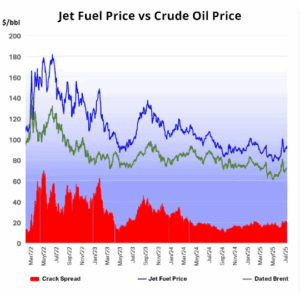
By: David Frangeul, Senior Director, Global Air and Ground Practices
As oil prices fall, airline fuel surcharges keep rising.
Despite a 15% drop in jet fuel costs year-over-year, airline fuel surcharges continue to rise, keeping airfare high for corporate travel buyers. This downward phase could continue until 2026, according to the World Bank.

Source: S&P Global Commodity Insights
Falling oil prices are good news for airlines. Fuel is usually the largest budget item, sometimes accounting for up to 30% or more of a company’s costs. You might also think that lower fuel costs would also benefit consumers with a drop in fuel surcharges. However, that doesn’t seem to be the case today.
When airlines first introduced fuel surcharges in 2004, these surcharges were intended to offset a proportion of the airlines’ increased fuel costs over and above a threshold price for a barrel of oil. Airlines justified the new surcharge as a temporary and systematic adjustment to market conditions.
But the system is no longer transparent except for a minority of regulated countries*. For years, the variation in surcharges has not followed the price evolution of a barrel. In reality, the amount of this surcharge continues to increase…even when prices fall. In the last 12 months, some airlines have increased their fuel surcharges by almost 50%.
The renamed ‘YR Carrier-imposed surcharge’ (replacing the more notable ‘fuel surcharge’) amount exceeds $ 2000 on a business round-trip ticket between the US and Europe and is at €900 between Europe and North America. It usually stands for 20% to 30% of the total cost of an intercontinental ticket.
Europe to the US – Business cabin – Carrier surcharge – Round-trip ticket – LHR-JFK (BA)/CDG-JFK (AF)/FRA-JFK (LH)

US to Europe – Business cabin – Carrier surcharge on a round-trip ticket – Delta / United / American

Source: Advito Airfare Predictor
The fuel surcharge as it exists today does not reflect the real cost of fuel for airlines. We have found that surcharges can vary dramatically even on the same airline, for the same cabin and itinerary. In non-regulated markets, the lack of transparency has caused the problem to spiral out of control.
Airlines must show transparency and establish a partnership approach with their most valuable segment – corporate accounts. For corporate travel clients, there are several problems with this airline-imposed surcharge model:
1. Surcharges are not subject to discounts.
Since the surcharge component is non-negotiable, corporate buyers may be faced with a substantial overall increase to their air spend. On average, companies save about 16% on intercontinental business class fares. With a growing portion of non-discounted spend, the fuel surcharge component becomes more and more costly. For example, on a typical round-trip business flight from the U.S. to Europe, around $320 per ticket is now lost in corporate savings. Overall, the additional costs can reach several hundred thousand dollars per year across global client spend.
2. Surcharges are highly inconsistent.
The actual surcharge a traveler pays on a given route will depend on several factors, including but not limited to: operating carrier, cabin, and country of origin.
For example, a one-way business class ticket on British Airways from London Heathrow (LHR) to New York (JFK) currently includes a total surcharge (YQYR) of £474. Book a similar ticket originating in New York, however, and your surcharge jumps to £757!
3. Surcharges are regulated in few markets, non-regulated in many of them
In countries with regulation, there are much higher levels of transparency and accountability. For example, in Japan, the surcharge is still labeled as a fuel surcharge. It’s clearly indicated on Japan Airlines (JAL) and All Nippon Airways (ANA) websites that the fuel surcharge may be increased, decreased, or abolished depending on the market price of fuel. For tickets issued on/after June 1 until September 30, 2025, the JAL fuel surcharge from Japan to Europe is €180 per sector. Compared to an average of €454 per sector by European airlines from Europe (non-regulated markets) to Japan, the surcharge out of Japan is less than half as expensive!
What should airlines do?
Since there is no link between the surcharge and the actual cost of the air service, it makes no sense to maintain these fees as a surcharge. This only contributes to client mistrust and confusion about airline pricing. Since fuel is something that must be used on every flight, it should be part of the base fare. Airlines that take action to adjust their pricing models and get rid of this obsolete surcharge will be in a stronger position to drive traveler confidence in their brand and services.
What should corporate buyers do?
Buyers should closely monitor the surcharge evolution of their preferred carriers and ask clarification from airlines about any significant change. If the surcharge increase is not justified, buyers should request to get savings off the additional surcharge amount paid in the last months. Airlines will likely tell you that they cannot apply discount on surcharges, but that doesn’t mean you’re out of options. Push for creative solutions. If the surcharge is fixed, they can offset the impact with stronger base fare discounts.
Traditional negotiation strategies aren’t enough in today’s complex air pricing landscape. To find real cost avoidance opportunities and savings, you need a data-driven strategy. That’s where our consultants and tools like the Airfare Predictor make a difference—combining industry expertise with advanced analytics to give you the visibility you need to negotiate smarter and stay ahead. Looking to better manage your travel spend? Contact our team to learn more.
* Some countries have decided to regulate the application of fuel surcharges, meaning the government has to approve any changes. These include: Australia, Argentina, Brazil, China (for domestic flights), Hong Kong, Japan, New Zealand, Taiwan, Thailand, The Philippines, Turkey and Vietnam.
